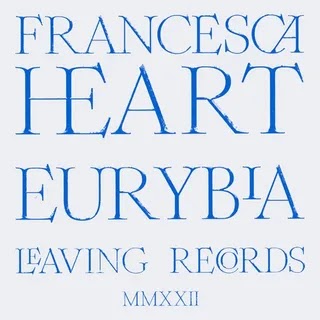Despite her new-age leanings, the Milan musician refuses to let her music fade into the wallpaper. With a playful, enveloping touch, she makes the most of the genre’s whimsical possibilities.
About 15 seconds into track two of Francesca Heart’s new album, the Milan artist’s veil of dizzying synths is pierced by what sounds like a dolphin’s chirp. Before you can process what’s happening, a noise appears like magic cartoon bubbles rising and bursting in midair, casting off their translucent spray in the process. It’s a glittering jumble of sounds as absurd as it is delightful. This moment feels like a microcosm of Eurybia: Where recent new-age music has often trended toward tones so soft and airy that they barely rise above the hum of background listening, Heart refuses to let her work fade into the wallpaper. Instead, she conjures vivid vistas with her sparkling palette, diving headfirst into the more whimsical side of new age with a playful, enveloping touch.
Compared to the current wave of ambient artists channeling the delicate environmental music of Japanese composers like Hiroshi Yoshimura and Takashi Kokubo, Heart’s music pulls from the quirkier end of the pool. Like older weirdo relics such as Andreas Vollenweider’s Down to the Moon and more recent left-field classics like Spencer Clark’s The Spectacle of Light Abductions, Eurybia isn’t made for taking candle-lit baths so much as it is for experiencing dazzling, hallucinogenic visions. Synths flicker like fireflies waltzing in the dark, while Heart’s voice refracts against itself in hard-panning echoes, at once inviting and disorienting. The sounds may be silky smooth, but in Heart’s hands they’re also exhilarating—a constantly unfurling tide of melodies spilling out in all directions at once while feeling eternally, peacefully still.
Eurybia takes its name from the Greek goddess of the sea, and in keeping with the theme, the album creates a lush world with the radiant colors of a coral reef. On the title track, Heart and fellow Italian hypnagogic guru Polonius gently layer swaying marimba lines until an iridescent drone streams through, like sunlight glistening beneath the waves. “L’Inno delle Oceanine alla Bellezza e alla Fortuna” is even more stripped down, revolving entirely around a bewildering mallet arpeggio whose spiraling notes contract and expand at will, dancing as nimbly as krill caught in an underwater whirlpool. Tracks like these might seem simple if they weren’t so texturally rich with ear-tickling detail; “A’Marina” verges on musical ASMR, with Heart coating the song in resplendent water droplets that shimmer psychedelically.
Heart’s greatest strength is her ability to imbue this ostensibly relaxing music with a rejuvenating jolt of energy; her more sedate tracks are less impactful. “Stella Rugiada” is calming, but at seven and a half minutes, it fails to go places that weren’t covered long ago by the likes of Michael Stearns. Likewise, the closing “Argentosfere” rests too heavily on its basic three-note synth arpeggio for the entirety of its runtime, turning up no new depths as it progresses. But outside of these moments, Eurybia is frequently bewitching, a reminder of how wondrous new-age music can be when powered by both curiosity and complexity. Rather than simply trodding down the path taken by seers before her, the composer charts her own way, playing with the tropes of classic new age to unlock ornate, heavenly new dimensions. In honing her craft, Heart earns her crystals.












0 comments:
Post a Comment